In Peking Opera, there are four roles: the male and female roles, the painted-face role, and the comedic role. These roles have the natural features of age and sex, as well as social status, and are artificially exaggerated by makeup, costume and gestures.
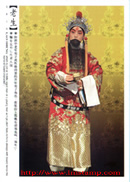
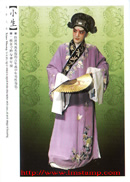
Lao Sheng and Xiao Sheng
Sheng
Sheng, a male role, usually a leading one, dates back to Southern Dramaof the Song and Yuan Dynasties (960-1368). This role appears in operas in all historical periods. According to the age and social status of the characters,Shengfalls into five sub-groups:Laosheng, Xiaosheng,Wusheng, Hongsheng and Wawasheng(characters of children).
Laoshengis also known asXusheng, meaning bearded, because the actors wear artificial beards, as they are middle-aged or elderly men. Most are upright and resolute characters. They sing in their natural voices, and their actions are serious ones.
Xiaoshengis a sub-category ofShengrepresenting young male characters. They don't wear artificial beards. They always sing in their real voices, while inKunquandPihuangoperas the singing mixes natural and falsetto voices.
Wushengstands for all of the male characters who appear in battle scenes. They are further subdivided intoChangkao Wuheng,Duanda Wusheng, Goulian Wusheng and Houxi Wusheng.They always wear helmets and thick-soled boots. The generals always carry long pikes.Wushengroles call for sturdy and vigorous actions, with resounding declamations. The movements of the waist and legs are powerful, and a high level of martial arts skills is demanded in these roles.Duanda Wushengroles use short-handled weapons, and their movements are light and swift.
Dan
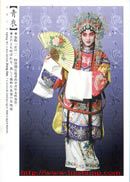
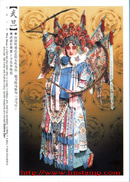
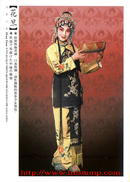
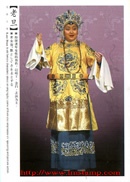
Qing Yi, Wu Dan, Hua Dan,and Lao Dan
The dan (female role) is divided into qing yi, wu dan, and hua dan, respectively representing: a middle-aged woman who always acts as a Mrs or Miss from a noble family; a woman who can fight; and a young girl who serves as a maid.
Qing yi was the main Dan role in the Northern Zaju.Qing yi refers to young or middle-aged women with gentle and refined dispositions. Most of Qing Yi's lines are delivered in song, and even the spoken parts are recited in rhythmic style.
